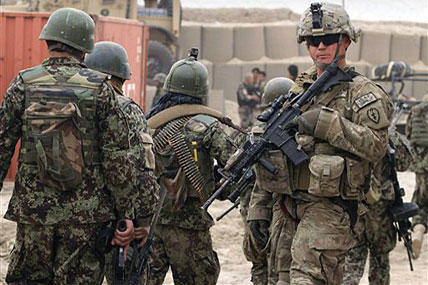House lawmakers heard a deeply bleak assessment about the future prospects of Afghanistan on Tuesday, in which one of the most optimistic views was that the U.S. would leave it in better shape than the Soviet Union had.
Government and think-tank witnesses told a House Armed Services Committee panel that there's a danger of widespread lawlessness and political splintering after the planned U.S. withdrawal in 2014, and what's more, few reliable measures or analyses to underpin the current plans for the transition.
Anthony Cordesman, a well-known defense analyst with the Center for Strategic and International Studies, questioned even the basic amount of money the U.S. will need to provide to Afghanistan each year to keep its army and police functioning after the transition.
"Until somebody can explain where they got that $4.1 billion figure, I can only point out as of May 2011, the figure was $7.2 billion to $9 billion for same size force. Even if you fully fund the mystery number, you have no reason to basically trust it."
And even if that amount does in fact keep together a force of soldiers and police that can competently execute its missions, it does not buy many important government functions that Afghanistan needs to have peace and order, Cordesman said.
"This is not, in any sense, a homogenous country. The tribal areas in the east, the tribal areas in the south, operate under very different rules. The justice systems have a strong [Taliban presence] running them. Wherever you do not have an effective government process, where courts and the legal system doesn't work, where you don't a have legal detention facility, you can't have a police function, regardless of how trained and organized they are."
Then there are also problems with the central government in Kabul, witnesses said, which has not made good on promises to reform itself and is widely seen as illegitimate because of rigged elections. Unless the Afghan government remakes itself and gives its parliament more power, virtually all the money flowing through the country goes at the direction of the president, Cordesman said.
Does that mean the U.S. should stanch the flow of aid? lawmakers asked.
"The idea that pulling the plug makes people behave better is not one for which I know of much historical precedent," Cordesman answered.
The state of the Afghan government at the time of the transfer of authority for the war will probably be its high ebb, he said, and there's little reason to believe it will spend the next two years on reform.
"If the government can't function as we leave, can't make the reforms it promised, can't get decent election, can't get a new leader, it might not make [the insurgents and bandits] win, but the end result is probably fragmentation," Cordesman said.
Another witness, retired Army Col. Joseph Felter of Stanford University, was slightly less pessimistic. He said the U.S. and its allies can "buy time" by focusing now on improving the central government and local security as much as possible while they're still there.
Tennessee Democratic Rep. Jim Cooper pointed out the war has dragged on for more than a decade – how much longer would it take to accomplish any solid improvements? he asked.
"We've got to use our remaining time, as determined by the political will here, to do as much as we can," Felter said.
He told lawmakers that even the Soviet Union was able to keep Afghanistan together after withdrawing from its occupation in the late 1980s, with support not unlike what the U.S. and its allies plan to give. The government stayed intact until the Soviet Union itself came apart and its support ended, Felter said. That helped cause the instability that the Taliban seized to take power.
"It wasn't pretty at all," Felter said, but it was able to hold together. "I'm not painting a rosy picture but it wasn't a complete collapse … history doesn't repeat itself but it does rhyme … we can expect as good if not better results in the government."




























